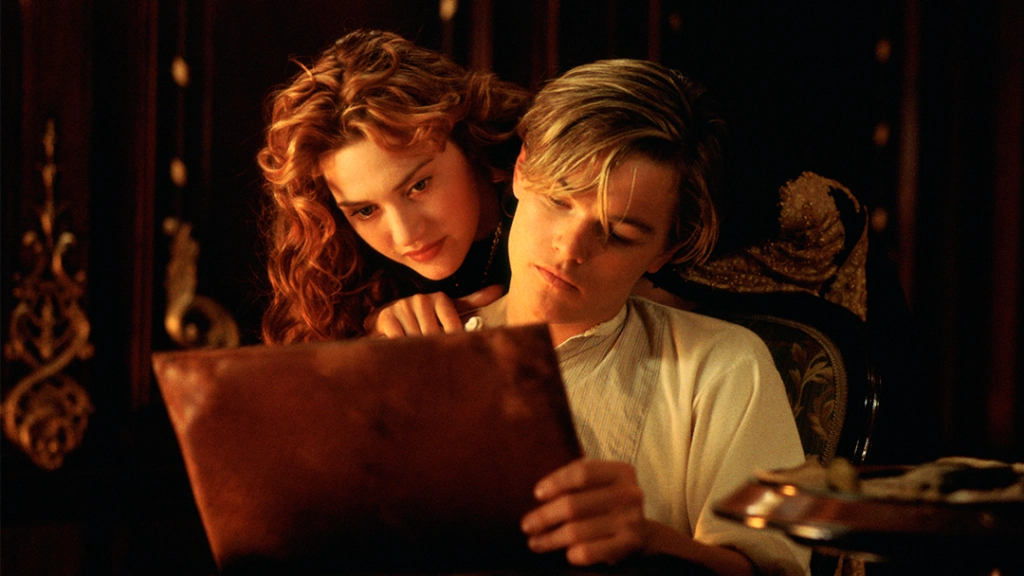Titanic Remains One of Cinema’s Crowning Spectacles
Written by Ian Thomas Malone, Posted in Blog, Movie Reviews, Pop Culture
Few pieces of popular culture capture the zeitgeist of the 1990s quite like Titanic. From its elaborate practical sets to its sappy dialogue to the unparalleled cultural phenomenon it was able to inspire, James Cameron’s epic represents the apex of twentieth-century filmmaking while paying homage to a tragedy our collective consciousness refuses to let go of. Twenty-five years later, Titanic still stands as a truly singular moment in cinema, a feat both of physical endurance for those who struggle to sit in a theatre for three hours and the emotional intelligence required to embrace the film’s ultimate mandate and cry amongst a room full of strangers there to experience the exact same tug on their heartstrings.
The magic of the theatre requires a buy-in from the audience beyond the mere suspension of disbelief required to follow along with a narrative parsed down to exist within the restricted confines of the medium. As a film, Titanic serves two distinct masters: the historical and the interpersonal. We the audience know that the boat sinks amidst several preventable tragedies, capitalism playing the role of God in choosing which victims to spare. Any human being with half a soul could acknowledge that this senseless carnage is in fact, sad.
Cameron’s exceedingly sappy love story across the barriers of class and culture forces the audience not only to reckon with the tragedy but to invest emotionally in the depths of its sorrow. Titanic is not a documentary, but a narrative that required a force of dramatic tension that could counterbalance the weight of its inevitable climax. You need over-the-top characters to match the irony of the fate of the unsinkable ship.
Jack and Rose’s love story is bound to resonate with anyone who’s ever enjoyed the fleeting perfection of a one-night stand. Leonardo DiCaprio brings a kind of manic energy to Jack that’s designed to change a person like Rose’s life, even if everyone involved knew that their kind of love isn’t built to sustain the morning after. Both Kate Winslet and Gloria Stuart manage to capture the essence of that swooning heart that got a taste of life’s purest essence, if only for a moment. Some love is only meant to last forever in memory.
Titanic is supposed to be silly, armed with a cartoonish steel baron (Billy Zane) and his equally outlandishly over-the-top valet (David Warner) to manifest the role of narrative villain in places where the iceberg’s dramatic range was far more limited. Kathy Bates grounds the silliness as the “unsinkable” Molly Brown, champion of the proletariat from her perch in first class, a fairy godmother to supply Jack with the confidence he needs to seize the means of production. Brown serves as a kind of Greek chorus through the absurdity of it all. Rose’s mother Ruth (Frances Fisher) is the living embodiment of the cruelty of man, willing to sacrifice her daughter’s happiness to keep her head above the working class.
The big screen has hardly been better-utilized than in service to Titanic’s third act. The special effects hold up marvelously all these years later, but Cameron’s mastery of practical effects has always been his bread and butter. At a time when many studios are looking to cut corners, the sight of tens of thousands of gallons of water ravaging an exquisite set never grows stale with repeat viewing. Rarely does a major blockbuster feel as grand as its budget suggests.
Cameron’s greatest strength is his unrelenting drive to amass a spectacle fitting of his source material. Titanic is a testament to a time when film tried to step outside the confines of the screen and change the very world around its walls. It’s easy to poke fun at the over-the-top nature of this epic, but the water settles around the endless debates of whether Jack could’ve fit on the door (yes) or if old Rose should have given her granddaughter the priceless jewel (also yes), one truth remains self-evident. There’s never been a cinematic experience quite like Titanic.











